#but most of these are about protagonists with flaws
Note
WHAT DO YOU MEAN DREAM'S HAIR USED TO BE WHITE!! oh my god. i just saw your post about killala and i have now perished. thanks for breaking my heart.
but also hi!! i'm relatively new to the fandom and it's a great place to be. i haven't finished reading all the comics yet but i'm curious to know:
what do you think are the main differences between TV!Dream and Comics!Dream? i've heard so many people claiming that he is incapable of changing, for instance, and though the show does convey his overall rigidity pretty well, i'm not getting the vibe that he's immutable.
also!! it's clear that he feels a lot. which is always funny to me when the corinthian is like yo, try this and maybe you'll feel something for a change but like. he does!!! or i get the impression that he does. he probably feels too much if anything?? all of it simmering just beneath the surface, barely contained. how would you personally analyze his relationship with his own emotions?
i hope all of this is coherent enough for you to answer lmao, i saw your post about enjoying being asked sandman questions two seconds after i woke up and barged into your inbox. hope you have a lovely day!
Thanks so much for the ask, and welcome if you’re new(ish) to the fandom! 🤗
I’m sorry I broke your heart—much more heartbreak to come I fear if you haven’t read the comics yet, so I’ll try to keep this as spoiler-free as possible.
I am one of those people who believes the differences between comics!Dream and show!Dream are actually not as big as they are made out to be where it matters, and you will definitely find people who disagree. At the end of the day, we all read it through our own lens and will never be fully objective about it.
The main difference I see is that they filed off the rough edges of the comics a bit to make a new audience sympathise more. It’s very hard to do that with a character who is basically in full arsehole mode for most of the first 40 issues or so, and even then only slowly begins to come out of it (although we can obviously see glimmers of what lies below the surface at the beginning of the comics, too, but it’s far more subtle than in the show). I’ve worked in musical theatre for a over decade of my life and understand a bit about bringing the written word to stage/screen, and some things simply don’t translate well from book to stage/screen, and you have to change it. So my personal opinion is we get a more sympathetic Morpheus and certain changes so the audience can do exactly that—sympathise off the bat. You will lose an audience pretty quickly if they don’t care about the protagonist and the universe he moves in, and you can’t be as nuanced about it as you can be in a written work. We’re talking about streaming services thinking about profits here, even if people don’t want to hear it.
Also: The more you sympathise with a character, the deeper the emotional investment and the more you feel, even if it hurts.
Having said this, I don’t think Morpheus is incapable of change, and I never got where that idea comes from. His biggest flaw is that he believes he cannot change (and even he has moments when he admits he might have). In the introduction to Endless Nights, Neil Gaiman says that he was once asked to describe The Sandman in twenty-five words or less, and famously, it was this (you might have heard it):
“The Lord of Dreams learns that one must change or die, and makes his decision.”
And I think some people might have wrongly taken that for an either/or thing. I don’t want to say too much at this point because I don’t know how much you know (if you’d like spoilers or already know how it ends, let me know, I’ll happily expand on it). Only so much:
He is capable of change, also in the comics. Very obviously so. But just like he denies he has his own story (which also isn’t true), he denies he can change. Or at least he thinks he perhaps cannot change enough (it’s actually hard to write about this without giving everything away, help! 🙈).
As for his feelings: He does feel, but again, it is something he pushes down and will deny himself. Until it bursts to the surface and breaks through, and when that happens, it’s usually with, well, let’s say varying results, and that’s putting it mildly. Personally, I’d say he has problems relating to his feelings, but that doesn’t mean he doesn’t feel. Quite the opposite in my view. He holds the collective unconscious—all unprocessed feelings and whatever else floats around in that collective mess, and it’s exactly what he says to the Corinthian in that famous scene: he needs to keep a lid on it and keep that lid firmly closed so all of it doesn’t consume him. But that also means denying himself the feelings that are linked to his own personhood (if you want to call it that). There’s Dream of the Endless, and then there’s Morpheus. And while they’re one and the same and inseparable, Morpheus is also the “point of view”. The character, the person, if you will. And deep down, he craves that personhood so badly. Out of all the Endless, he is the only one who basically collects names because they mean having something beyond his function, which is also mirrored in what he tells Death in “The Sound of her Wings”: he wants something more. He is the only one whose realm is populated with sentient beings (yes, I know Despair has rats, but I think you get my drift). He is desperately lonely and struggles with it. He seeks connection yet denies it to himself. That’s not someone who doesn’t feel.
I don’t know if this answers your questions at all—I was doing the wild “spoiler-free” dance 🤣 But please let me know if you want me to go a bit deeper, I love talking about this stuff.
You can also have a look at my metas if you haven’t already. The headers pretty much explain what they’re about and what spoiler-level to expect, but none of them are truly spoiler-free I guess:
Again, thanks so much for encroaching on my inbox, and feel free to follow up if anything was left unanswered.
@dreamaturgy ask answered
#the sandman#sandman#dream of the endless#morpheus#sandman meta#ask answered#send asks#sandman analysis#sandman character analysis#sandman comics#the sandman netflix
30 notes
·
View notes
Text
It's this article even real? I found it hard to believe someone would read the manga or watch the show and decide that Naruto "doesn't need the overdone Sasuke Arc".
First and most importantly, Sasuke singlehandedly moves the entirety of the plot forward, he doesn't have an entire arc dedicated to himself because he's relevant for every single arc the story possesses, and he's the reason key characters behave the way they do; taking away Sasuke's journey to make him a complying tool of the state wipes out the reasoning behind every villain's actions, therefore, it destroys them as well.
It's hilarious how this article exists to take away Sasuke's relevance within the story to give it completely to Naruto, something his fandom has wanted since the very beginning of the manga and that Kishimoto never complied.
In the Naruto series, Sasuke was Naruto's rival in the Hidden Leaf. However, he was training to kill his older brother, Itachi, for wiping out their clan. In time, Sasuke would learn Itachi did what he did to protect Konoha as their Uchiha kin wanted a coup. This enraged Sasuke, who nonetheless vowed to kill Itachi and exact revenge on Konoha.
Okay so, we start awfully, and no surprises there. Sasuke killed Itachi and later on, through Obito, learned about the reasoning behind his brother's actions. It's after this that he vows to bring down those who allowed and encouraged the construction of a system that pushed the Uchiha to rise up against this power dome and forced his brother to murder his entire family.
Regardless of the circumstances, Sasuke hated the fact he had to grow up alone. This is the reason he joined the Akatsuki, formed his own terrorist cell called Taka, and tried to murder Naruto after the wars against Obito and Madara.
No. You cannot use "regardless of the circumstances" when those circumstances are detrimental to his character's actions and the functioning of the system against which he, like other characters throughout the plot, stands. He not only hated having to grow up alone (a consequence of, once again, the genocide carried out BY THE STATE ITSELF through his brother), but also the indiscriminate murder of his relatives, both those who engineered the coup and those who were profiled based on biological conditions over which they had no control.
Also, there was one single war against Obito and Madara that stretched through a couple of days for which he participated in bringing down both of them as his idea of revolution didn't partake in their idea of absolute control of people's minds.
The Naruto movie (and obviously, the sequels) would be better served by doing something unpredictable. The Evil Sasuke arc is overdone, especially since it comes up in the Boruto era. In the latter case, a redeemed Sasuke keeps using it as a lesson to teach Boruto and Kawaki why they should not let rage guide them. Fans don't like being reminded how unnecessary this was in the source material.
Overdone? Did this guy actually watch the anime at least? The entirety of the plot focuses on the system flaws that even the protagonist is "set to change", Sasuke's arc is detrimental to the story as both Naruto and Sasuke observe the same issue from different standpoints, the former wants to keep the system and make gradual changes as not to "bring chaos" and the latter wants its complete destruction as a gradual change only guarantees greater injustices being committed over time until it is "changed".
Take Sasuke off of this equation and there's no reason for Naruto to even go on or have any introspection on the matter of Konoha's political and military system --and I'm being incredibly kind about this as even when Sasuke blatantly exposes it Naruto has a hard time grasping the most basic concepts to rebel against.
Additionally, Sasuke's villain arc would be a lot to condense into live-action, even if it's done over a trilogy. It could be done the way the MCU took 10 years to build the Thanos fight in Avengers: Endgame, but by that time, the story would be stale. Everyone would know what happened. The advantage the MCU had while adapting the source material is that it subverted the lore and crafted an original story. c
Does this author actually know what "adaptation" actually means? Or what it entails? What they seem to want is a reversion of the story as they desire to modify the entirety of the character that is the main plot device within the original product, not an adaptation. Also, what's with the last phrase? How can Sasuke be a loyal rogue? That's a contradiction in itself, is he a rogue of Konoha or is he loyal to Konoha? Pick one -you can't have both.
The advantage of Sasuke being a rebel without defecting from Konoha is that Naruto would have the help needed to fight the big villains of the franchise: the Ōtsutsuki.
Sasuke fought alongside Naruto against Kaguya, bringing the union of former Team 7, without having to compromise his original ideals... did they just... forget?
Kaguya was the first alien who came to Earth, got sealed away, and then tried to return to enslave it. Naruto and Sasuke were reincarnations of her sons (Ashura and Indra, respectively), but the manga and anime didn't spend much time detailing how they would form their clans down the line and the emotional impact Kaguya had fighting her descendants.
Haha, come on, this is clickbait isn't it? Ashura and Indra are not Kaguya's sons, they're her grandchildren that reminded her of her sons, bet your ass this is a Boruto fan that just heard about the original series and wrote whatever this was without eyeing the og manga.
but the manga and anime didn't spend much time detailing how they would form their clans down the line and the emotional impact Kaguya had fighting her descendants.
That's because one of Kaguya's sons went to live on the moon and the other one, Hagoromo, had two sons on Earth (Indra and Ashura) who -as the manga establishes, founded their own clans (Uchiha and Senju respectively) that were at war until Konoha's foundation.
It focused heavily on Sasuke plotting in the shadows, and Naruto forming an army, realizing much later in the story of their link to Kaguya.
What? They learned about their connection to Kaguya through Hagoromo before fighting her, Sasuke also never plotted in the shadows, he blatantly tells them he wants a Revolution and later on decides to kill Naruto as he's his last connection to his past! That's the whole reason they fight!
By switching this up and making lineage a primary and not secondary arc, the movie can dial more into the emotional core: Sasuke and Naruto exploring their family tree and the overall theme of dynasty. Sasuke could learn more about how Indra developed a dark side, which passed down to the Uchiha, while Ashura's light gave way to the Senju and Uzumaki (Naruto's family) clans.
That's incredibly explored throughout the manga. The Senju are the only clan linked canonically to Ashura himself, the Uzumaki obtained Ashura's attention after the Senju disappeared as they were distant relatives.
Also, love the distinction of "Indra developed a dark side which passed down to the Uchiha" and "Ashura's light gave way to the Senju". Hagoromo favored this distinction by granting the totality of his power to one of his sons and expecting the other to be functional to his brother's decisions. If Hagoromo considered that Ashura's position was better than Indra's, why did he not teach his eldest son to make similar decisions? How is it that Indra decided to form a clan and a collective group of people if his idea was to move and gain power alone? How is it that Ashura, the being full of light, decided to fight his brother for power instead of seeking a peaceful solution to work together if what he wanted was power through union? Why did he not question the idea of a single person having the totality of command?
This would allow the movie to not hinge on Naruto and his fate with his Nine-Tailed Demon Fox (Kurama).
This just proves my initial point.
Instead, Sasuke would become a key player by garnering clues as to who Kaguya is. This would also unearth her plan to place everyone in a dream state (via the Infinite Tsukuyomi genjutsu technique) and drain their chakra. In other words, he would be the egotistical brains of the operation, while Naruto functions as the go-lucky muscle.
What's the point of doing all that if this exact thing ends up happening anyway without having to destroy any character's core? Are they serious?
This would not be different from what's been seen with Iron Man and Captain America, and Batman and Superman.
Brain minimized by the same comic story over and over again, what's the point of seeing a dynamic story repeated hundreds of times in different products? Is the main idea of this theme to make audiences like this guy believe that he possesses some kind of intellect because he can predict a plot he has seen thousands of times before?
Such an approach speaks to the legacy of both warriors, which makes them the yin and yang they were meant to be.
Don't believe this fool. Sasuke and Naruto as characters explore the Yin and Yang implications very well as they are, he doesn't seem to understand what this metaphor actually entails.
Such a change fits Sasuke's destiny organically because this is the kind of sleuth he would become in the Boruto era, where he atoned and roamed the lands as a Ranger. This same development felt rushed and left-field in the manga, as he never did that kind of work before.
Making Sasuke a heroic anchor in the Naruto movie also works for the evolution of Team 7. To start with, Sasuke, Naruto and Sakura were all trained by Kakashi, but their story felt disjointed. Naruto was preoccupied with bringing Sasuke home, Sasuke was off seeking Itachi and an army, while Sakura tried to quell the anger in both of them. This took away time from her personal development and detracted from the bigger threat of the aliens. By making the plot so convoluted, fans found it odd the Boruto era would marry Sakura and Sasuke, despite them never being developed as an official romantic couple.
By not splintering the team, Naruto's director, Daniel Destin Cretton, can focus on what made Team 7 work in the first place. Sakura was known to stop arguments and function as the team's mature, responsible leader. Naruto also liked her while she liked Sasuke. Sakura eventually realized she needed to change the views of Konoha and have the village recognize female shinobi more. This worked in the love triangle that allowed Sasuke to develop feelings for Sakura that would pay off down the line. This would also allow Naruto to understand he was meant to lead the Hidden Leaf.
What is removing Sasuke's entire characterization gonna do for the rest of the characters? The author is not saying Sakura realized this canonically, by the way the paragraph goes, what he implies is that she could realize this in the movie. So he’s telling us that Sakura didn’t notice she needed to change Konoha’s views about females because Sasuke wasn’t there to help her or what? It's Sasuke staying that detrimental to her development?
He wants to change everything about the original Team 7 in order to make them fit their Boruto’s characterizations. Hell, I bet he’s a Boruto fan who barely watched the original series, I’ll go as far as to state he used AI to write this garbage.
That also was Tsunade’s ordeal as well. Shikamaru questioned her involvement and was proven wrong when she “consoled” him after Sasuke’s Retrieval Arc and proved herself to be a good Kage. He’s asking something of Sakura that Tsunade already did.
Does he know what character development is? Why should they change everything about the original series to fit better the spin-off? Is the spin-off that it's badly written as it couldn't follow the original's characterizations, not the other way around.
According to his page, Renaldo Matadeen, "author" of this abysmal take, focuses on: As a filmmaker and scriptwriter, Renaldo loves to dissect the nuances of stories, especially narratives involving people of colour, minorities, and the socially-displaced. He believes art is a medium to reflect and provoke, and loves engaging in content that evokes this energy.
So you mean to tell me that Sasuke, a metaphor for the socially displaced people, a survivor of a state-sanctioned genocide, and a revolutionary is somehow better by being stripped of any value inside a story that focused on his struggles, to begin with? That somehow the story would be better if he, a minority, was more complacent with the State that represses him?
30 notes
·
View notes
Note
opening random encanto yt videos’ comments section is like staring at the waking storm you’re about to plunge into and knowing it’s not gonna be pretty and you’re probably not getting out of it unscathed (aka calm/happy fine—also sorry pepa oof—)
god the amount of misinterpretations people have with the movie, with so many scenes is insane, i’m about to go even more insane myself than usual
it’s so frustrating and i want to throw my phone every time AAAAAAA
but anyway yes, i wrote this ask in the first place to ask about your thoughts on different details and plot points and just general stuff of the movie that you noticed and really love, with any/all of this helping you appreciate the movie more? just anything, really, your choice on whatever you wanna ramble :3 (also to make up for how my last question had stopped you from rambling AHAHAH)
because i know you have so many good ideas and thoughts, so i’d love to hear it hehe :>
hope i made sense with the question, just a bit sleep deprived rn haha, but yes, ty!! <33
I totally relate to this feeling😭 except instead of YouTube comments it’s like almost every platform💀 and thank you for the ask!!
I could rant forever about all the details in this movie honestly!!!
The foreshadowing is SO good in this movie!! waiting on a miracle and the family madrigal being obvious ones but did you guys know the order mirabel sees the doors flicker when she sees the cracks is the order they lose their powers in? Isa + Luisa first because that’s who’s powers act up first dolores + camilo + antonio at the dinner scene and alma last because she was the last one willing to admit the problems!!
I love the character design!! I’ve rambled about it many times but it’s just !!!
I love how despite mirabel being our protagonist they show when she’s wrong and other characters call her out! She’s not a perfect protagonist she’s a flawed teenage girl and that just makes her more endearing
I love that they didn’t make Mariano a mean character just because isabela didn’t want to marry him. The problem isn’t Mariano it’s isabela feeling trapped!! Mariano is also shown to be considerate!
I love that most of the focus is on the female characters (if only the fandom would do that) I love seeing a multigenerational cast of women all flashed out with their own unique traits
about the misinterpretations i completely agree. I feel like this fandom has a “fanon” problem. especially with the most developed characters! surprisingly the ones with the most screen are the most common mischaracterised. I really dislike how encanto as a movie went to such an effort to give every character such a variety of traits and nuance only for the fandom to continuously reduce them down to one singular trait. It almost feels like reinforcing those stereotypes the movie was so set on breaking. As well as this continuously ignoring some of the best canon traits each character has. They feel so far from the original you might as well consider them ocs at that point.
I love the animation on Bruno’s vision shards (they look edible), I love the little details in mirabels room like her outfit sketches being hung up on the walls! THE BUTTERFLIES!! this movie has so many hidden butterflies it’s so fun to spot them!!
the soundtrack obviously but also the score!! only recently discovered that “the house knows” is a reprise of “the cracks emerge” it blew my mind!!!
One thing I really love about encanto is the expressions! they can convey so much with so little and the little subtleties it adds to each character is just incredible to me!!
SKIRT ANIMATION. it’s like hypnotizing to see how the skirts flow in this movie I am glued to the screen every time.
the dos oruguitas scene is gorgeous and so incredibly important to the core message of this story! As well as this scene the fall of casita is another incredible one!!
the songs feel like full blown fantasy musical numbers and I don’t know why people consider that a criticism of the movie is about MAGIC I want to feel that magic in the visuals of the song. So each musical number was like the most incredible experience!!
I love how waiting on a miracle starts off as a reprise of the family madrigal before changing to 3/4 time to show how mirabels out of place
the line “how far do these roots go down” hits so hard and I cant explain why
Felix and pepas love is so real and pure
julieta and agustín are incredible parents
dolores entire design
the fact luisa wasn’t reduced to a stereotype and was allowed to be flawed
mirabels voice!! it’s so unique and recognizable like I love it sm
the way felix sings “no clouds allowed in the skyyy”
I love that the characters actually look their age!
almas room being a replica of her old home showing how metaphorically and physically she’s stuck in the past
“I was thinking of my daughter!!”
I love that with isas transformation it’s not her hating femininity but changing what her femininity means to her
I love how mirabels worst enemy is her own mind. the madrigals aren’t aware of how she feels because she never opens up and it’s just slowly eating her up inside. in the end mirabel needed to acknowledge herself in order to grow (I say acknowledge because I refuse to believe it’s acceptance and I think she would still struggle with her self perception post movie)
I love how the Madrigals use their gifts to help their community and not for self gain. It’s such an interesting twist on the classic superpowers story
I love that the Madrigals are just normal people who randomly got a miracle, nothing of status just normal people in a normal town who got gifted.
the way pepa kisses antonio and hugs him after he gets his gift !!!
the way isabela is the one to initiate the hug but mirabel is the one who snuggles into it
julietas smile
the entire animation is so gorgeous!!
antonio. just antonio if u hate antonio I hate u
I love how realistically written alma is and how her story is treated with respect and nuance.
how all the madrigals problems aren’t solved instantly but it’s shown in a montage that happens over large period of time
#encanto#encanto disney#disneys encanto#mirabel madrigal#mirabel encanto#isabela madrigal#disney’s encanto#bruno madrigal#luisa madrigal#dolores madrigal#camilo madrigal#felix madrigal#pepa madrigal#julieta madrigal#agustin madrigal#abuela alma madrigal#ok I’m done rambling#thank u for the ask!!#this was so fun!!#I love this movie so much
20 notes
·
View notes
Text
Generally speaking, it's a well common trait for a character to be loving to everyone except for themself, but it's important for the audience to keep in mind that Micah doesn't follow that archetype and fall into that strong consistent self-hatred when every single day since they reached to early twenties, they would be more kinder and forgiving to themself for what and how they are like. Micah does try to love themself more often from significant to smaller ways and from little to greater degree. Some of the practices that Micah engages in as a form of self-love are:
Drawing hearts with stars in marker around their recent small injuries.
When Micah forms a negative thought to themself, they try to find something positive about themself to retaliate that self-negativity.
Have journals to document solely their joys and comforts and accomplishments.
Although they are still lost with certain aspects of themself while there are parts of them that Micah is still anxious or insecure about, they do firmly believe that they deserve so much better, while they should be given the kindness and respect that they deserve to have from the world that doesn't love them enough
#𓁹 ༑ ࿐ྂ ⩇⩇ : ⩇⩇ ⚠︎ [ 𝙴𝚇𝙸(𝚂)𝚃 : 𝙶𝙾𝙳 ] * ‹ THOUGHTS . ›#𓁹 ༑ ࿐ྂ ⩇⩇ : ⩇⩇ ⚠︎ [ 𝙴𝚇𝙸(𝚂)𝚃 : 𝙶𝙾𝙳 ] * ‹ STUDY . ›#𓁹 ༑ ࿐ྂ ⩇⩇ : ⩇⩇ ⚠︎ [ 𝙴𝚇𝙸(𝚂)𝚃 : 𝙶𝙾𝙳 ] * ‹ MICAH . ›#[ I completely get the vibe of a character loving everyone while hating themself most and only ]#[ but for me personally ; I love a character who tries to give themself just as much love as they give to everyone else ]#[ like one of the things I extremely enjoy about Micah's character is that they do firmly believe that they deserve love and being loved ]#[ just as every good people does ]#[ and Micah always think that if people won't give them that ; then they can and will give that love to themself regardless of everything ]#[ and it IS hard. it isn't ever easy to not make yourself fall back to the fear and doubt in self ]#[ but Micah is very much aware of that and has been trying so unbelievably much to ]#[ be more kinder and forgiving to themself - especially when they do make mistakes or ]#[ when something happens that make them feel and think as they or certain flaws of themself are the direct responsibilities ]#[ idk I want more characters who loves everyone and especially they /try/ to love themself as much ]#[ and I'm extremely thankful and happy that Micah is like that when especially as the main protagonist of the story ]#[ I'd imagine how adored and admired Micah would be for that as one of the most endearing and inspiring things about them ]#[ I love them so dearly and infinitely much. they just want to love and be loved ; and so they will and will be so forever despite it all.
8 notes
·
View notes
Text
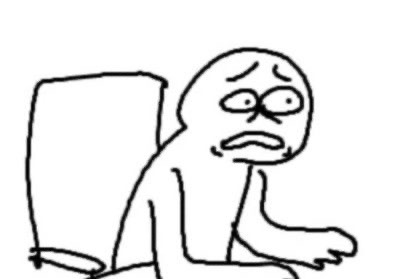
Current yugioh gx watching experience (I’m well into season 3)
#i mean this in a good way#this show was silly for so long but then it’s like haha jokes on you were no longer primarily episodic we’ve got linear storylines now#hosestly it’s just making me go insane over jaden#like everything about him screamed GOOD GUY for most of the show#from his deck of literal heros to his actions he was just a genuinely nice guy#who got along great in life when things were good#thinking back I don’t think he had any major flaws#like he wasn’t good at school but that’s not really a flaw in a show like this#but being thrown into a serious situation like this#brought out the worst in him#his concern for Jesse overshadowing the friends right beside him#he promised to be more careful and not go out on his own and immediately broke those#and look where that got him#watching this guy who was seen as a great hero and greater friend#end up getting all his friends killed because of his own flaws#idk man#i know this is just the beginning i know it’s going to get worse#I think deeply flawed characters especially deeply flawed protagonists are much more interesting then good guys who want to save the day#so I expect jaden is going to go from a character i like a lot to a favorite#my goodness#it’s 1am and I have work tomorrow#is this even coherent#aaaaAAAAAAHHHHHH FICTIONAL CHARACTERS#AAHHHH#AJDKKAAJAK#FJSKAKAJAHHA#goodnight everypony
2 notes
·
View notes
Text
i just wanna point out that, like. it's okay to disagree with the main character. just because they're the pov of the story doesn't mean they're infallible or that their word is law? you can like that character that tried to kill the mc. you can think the mc made the wrong choice. you can forgive things that the mc would never forgive, or choose not to forgive things that the mc does, because you're not the main character. you are the reader of the story, and just because you can't change it (and it's not the author's responsibility to capitulate to fans) doesn't mean you can't form your own opinions about it. it's fictional! that's the point! have fun with it!!
#sometimes.... main characters....... can be wrong#of course authors will generally try and make you like or agree with the mc (in some way at the very least) but like.#even the most perfect 'good guys' have flaws or else it's not usually a very well written story. and it's okay to acknowledge that!#it's not even really an issue of the whole 'protagonists can be bad guys/antagonists can be good guys' thing (ex. death note)#but like. even if you 100% root for the mc and think they're totally in the right you can still..... like the character that betrayed them?#nothing you say or think about them will make them NOT betray the mc in canon. so why does it matter if you like them despite it?#it's fiction - you can like multiple parts of the story simultaneously. it's okay. i give you permission.#on a similar note. it's okay for people to have different opinions about the same thing#to continue the analogy: maybe your friend doesn't forgive that guy for the betrayal but you do. that's great!#everyone can have an opinion about that guy and just bc someone disagrees with you doesn't mean you can harass them to change their mind.#while im down here#sorry about all this. im procrastinating on a project and ill do anything to stop thinking abt it so im thinking abt this instead#take death note. i do NOT agree with light but i also don't necessarily agree with L either. and i like both of them!#light HATES L and yet he's one of my favorite characters. i hate everything light does and yet i really enjoy reading from his pov.#its not black and white!#have opinions! change them after two days or think about the same blorbo for years! critical thinking and personal enjoyment can coexist!#anyways.
5 notes
·
View notes
Text
Physco analyzing owl house characters part 2: Luz
(Spoiler warning for s3 ep 1! And tw again for mental illness, death, trauma, etc)
This time I'm gonna talk about Luz- a protagonist who canonically has ADHD. She's seen throughout the show being impulsive, indecisive, and hyperactive with a tendency to hyperfixate on certain interests such as glyph magic and the good witch azura. Time and time again, this gets her into trouble with peers, teachers, and friends as she's ostracized for being different without knowing why. She's seen as being absent minded, disruptive, and lazy when in reality, she's just trying to navigate a world that wasn't made for her.
Things like social isolation, academic struggles, and bullying are all things that can often be traumatic on their own but it seems Luz handled these things very well with the support of her mom for most of her life.
Her dad's death was not only extremely difficult for her because she lost a loved one but also because people started misunderstanding her even more, seeing her normal differences from her peers as a reaction to her loss. Suddenly her behaviors were seen not as quirks or differences but as attention seeking and acting out.
A common trait of adhd is rejection sensitive dysphoria- when rejection is either perceived when it's not really there or perceived as being much more intense than it really was meant to be. I feel like Luz experienced this when her mom suggested she go to a summer camp to "help" her, feeling she was losing that support from her mom, even if in Camila's eyes, it really was meant to help her.
She didn't want to be fixed, she wanted to be understood and so she ran away. I think being in the demon realm was so appealing to her because everyone acknowledged that she was LITERALLY in a world not made for her which made her feel more understood and accepted, even though she still faced a lot of the same obstacles as in the human realm.
It seemed like a lot of her trauma started to really affect her once she realized she really couldn't get back home. She's seen after that point being more avoidant and even secretive with people she cares about as she continues to internalize her mistakes as character flaws, which only intensifies as the show goes on.
In thanks to them, she very obviously displays symptoms of depression with changes in her mood and sleep and the episode even suggests some suicidal ideation at points. People with adhd are 2.7 times more likely to have or develop depression than the rest of the population and very likely to have insomnia. Even by the end of thanks to them, Luz is still very obviously burdened and I can't wait to see how she goes forward throughout the show, hopefully gaining back some of her carefree spirit by the end and trusting her friends to accept her.
#toh#the owl house spoilers#toh spoilers#toh speculation#toh s3 spoilers#toh s3#toh characters#the owl house#basically please someone get this girl some therapy ;-;#she genuinely my favorite protagonist in any show ive seen tbh#shes so multi faceted and interesting#i deeply understand her inner conflict and flaws and i love to see someone acknowledge them in media#like adhd is talked about sooo much (or at least more than most disorders) but the actual struggles of it are usually overlooked#luz is a great example of a lovable character with (redeemable) flaws and the amount of growth shes already gone through is insane
31 notes
·
View notes
Text
See, the issue with me is that every single time I replay Origins I fall in love with everything about it more and more.
Which consequently also makes me hate Inquisition more and more vitriolically each time.
#dragon age#dragon age origins#dragon age inquisition critical#inquisition critical#2 is the middle ground if you're wondering. it has a lot of flaws but I still love it a stable amount.#inq though. inq my behated. my beloathed.#at this rate my da keep will never be completed jhbjgs#Imagine setting up and fleshing out such a fascinating and wonderful dark fantasy world#only for the second successor to spit at everything you created- retcon half your shit and add nothing of value#not content to JUST sanitize it for mass consumption- but doing so by placing the protagonist as head to a fucking religious institution!#FORCED TO WATCH / T H E M / DO THE SANITIZING IN REAL TIME! MMMMMMMMMMMMMMMMMMMMMMMMMMMM#Also i vehemently hate the '[x pagan/non christian coded god/ deity] revealed to just be some guy!' trope. I fucking despise it.#just spit at my face and tell me my religion is childish and stupid instead! Save us both some fucking time!#Then there's the whole plight of the mages being treated as fucking laughing stock and the wardens suddenly becoming incompetent babies#most likely just to bolster your protagonist's ego because look! This whole supposedly world saving order is stupid enough -#to fall to Coryphallus! But not you inquisitor- you're truly so strong and special and perfect and so much better than them!#just thinking about the wardens in inq. Mmm violence.#You know. darkspawn chronicles implies the Warden is the only reason the blight was defeated right?#similar to how the time traveling in inq implies the inquisitor is the only one that can stop corypenis#However the big difference is that 1. neither the warden nor the player explicitly know (could be assumed that Alistair/Riordan-#would manage without you)#2.though your recruitment was coincidental- it was still /earned/. and your connection to the taint is what influences it ending.#you're not a chosen one. just one of the chosen ones; in a sense#3. by inq- after seeing to protagonists accomplish way more with way less. I'm sorry but magic hand or no i'm not convinced-#that the inky is the only person capable of saving the world. Just not buying it.#And i'm not even done touching on HALF the things I hate! Yet another example: inq as a game has the strongest obvious agenda#and it's infuriating#Oh you're allowed to be a piece of shit to Sera; but you want to tear into mother Gizelle for literally spreading fucked up rumors-#about your love interest (talking about Dorian) and then having the GALL to come up to you fake concerned asking you to break up?#sorry mate the worst thing you can say is 'And where did those rumors come from?' mildly aggressively
69 notes
·
View notes
Text

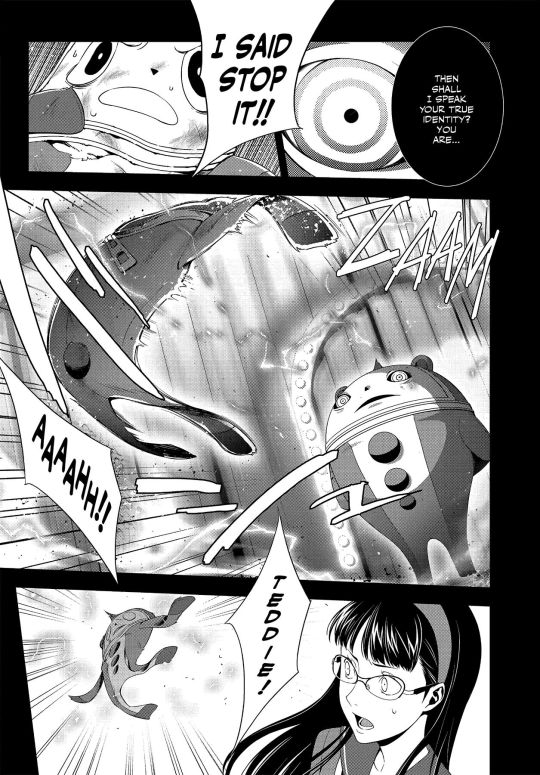
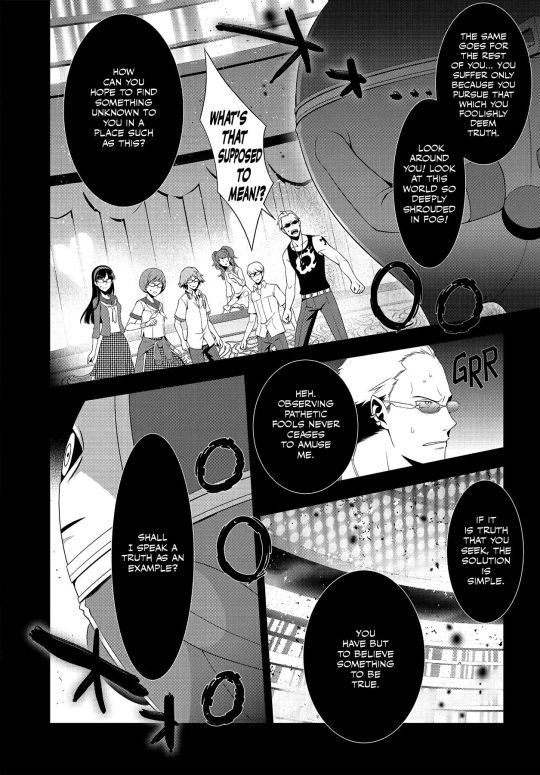

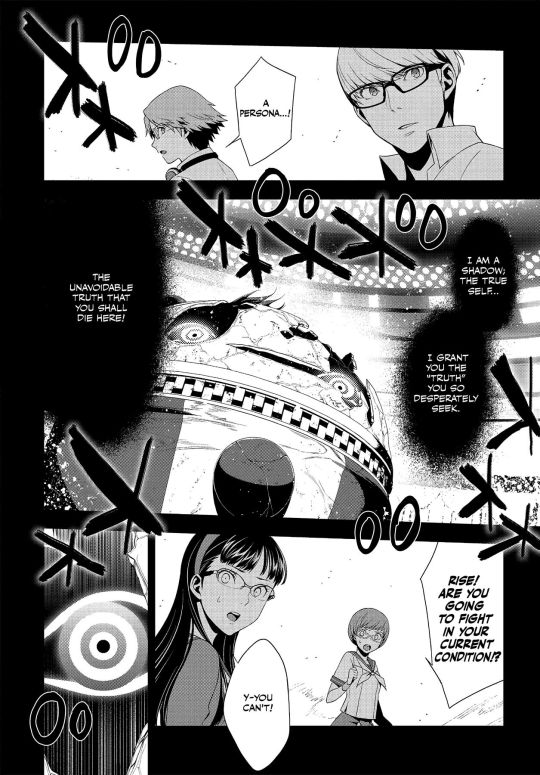
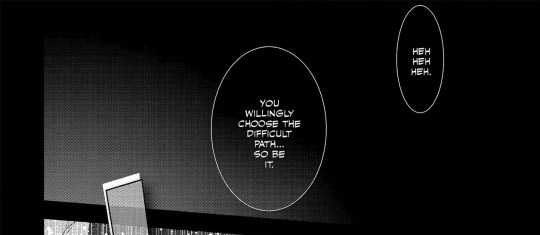

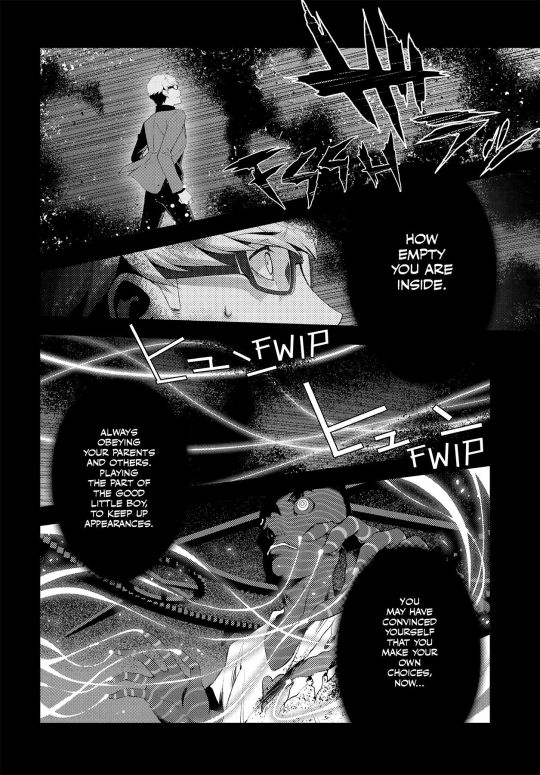
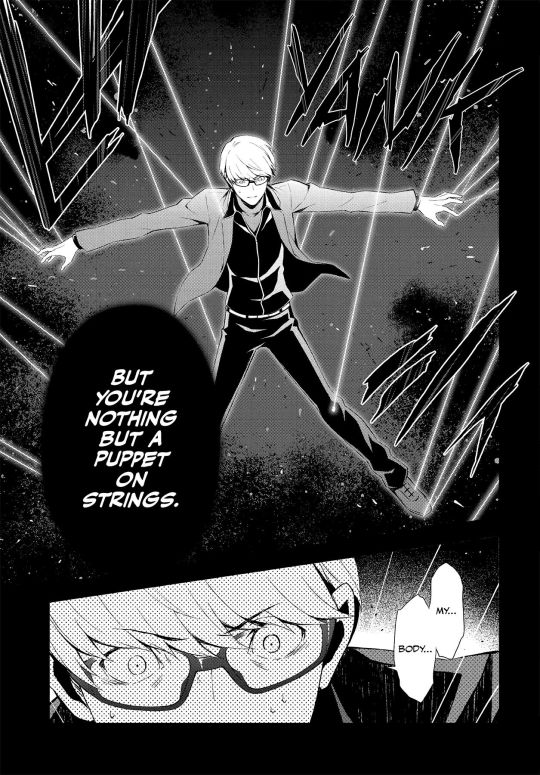
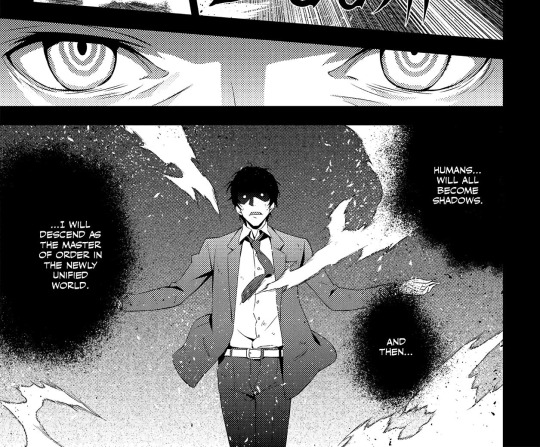



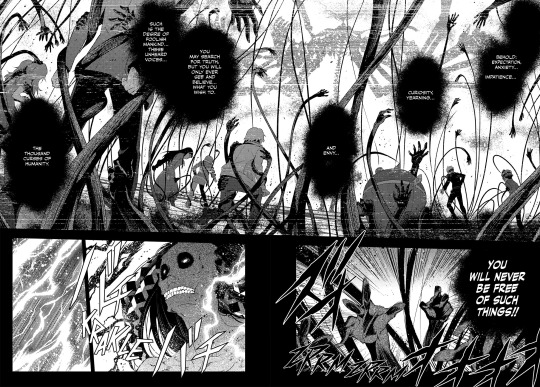
sogabe was so real for this
#persona 4 spoilers#persona 4 manga#p4#// izanami? in MY sagiri? nofucking way. hes following lore for once#// sitting down hugging legs do you see their eyes do you see the rings do you see the speech bubbles do you see their philosophy do y#// twitches eyes i am normal about this everytime all the time always <- affirmation <- completely batshit insane about this#// souji is empty SOUJI IS EMPTY TOO !!!!!! RATTLES HIM SHAKES HIM MAKES MARACA SOUNDS <- doesnt explain#// SOGABE SENSEI SHOULDVE BEEN GIVEN MORE PANELS TO DRAW IZNMI MRE SHESO PRETTYY <- deprived#// SORRY their humanoid portrait wasnt even finalized by soejima himself SORRY both anime art direction were complete ASS#// she was there from the start there from the start there from the start there from the start there from the start th#// except the game was SO LOW BUDGET they didnt make it as good as yal—THEY GAVE HIM A CONFIDANT WITH THE PROTAGONIST#// iznmi did her role of being the most forgettable unnoticeable inconspicuous bitch in the whole of inaba AND in real life#// something something dont worry misszanami i saw your chanel boots something something#// BIGGEST FLAW TO THIS IS THAT IT DOESNT HAVEC MARIE IN IT OTHERWISE SOGABE'S THE GOAT IN THE ENTIRE WRITING OF PISS FOUR#// iznmi is nothing but a girlemployee failwife boykiller thats my take /gets dragged in by the thousand curses or whatever/#// if there was ANY official media i could ever want with mim in it it would be a drama cd voiced by kasuyan. and an omake by sogabe#// wish i could be more coherent about this except i really am so batshit crazymad right now. i mean i am so normal about things
17 notes
·
View notes
Text
i love mob psycho so much <3 aough. the narratives
#like everyone is flawed no one is perfect no one is special but everyone still deserves to live.#everyone deserves to have ppl who care about them and ppl they care about#everyone deserves to be happy. everyone deserves a chance to help others and be helped. everyone deserves a change#everyone deserves to be the protagonist of their own life .#its ok to be selfish its ok to be emotional its okay to be different. but most importantly#you have to live life for yourself. be it by helping the people around you or growing as a person yourself#UGHGHRHRH . SO MANY THEMES. IM GONNA BITE IT APART#Video essayists have made other points more in depth . basically watch Mob Psycho its so good#mp100
6 notes
·
View notes
Text
I bring a real "Doctor x River OTP" vibe that a bunch of the DW fandom doesn't really like.
#the ONE good thing about college is that most of the fans I met there really did love her and this ship#but I think that might be because we were all mentally ill and Going Through It™#not that like. shipping this is a symptom of mental illness I just mean that this relationship was...honestly kind of unlike anything#else that was onscreen at the time?#she got to be MESSY. she was incredibly extra and emotional and vulnerable and she got to MESS UP SOMETIMES. IN REALLY BIG WAYS EVEN.#she was a genuinely MORALLY GREY character and all of these were seen not as things that made her inherently harmful or#someone the protagonist should At All Costs Stay Away From#but as someone uniquely equipped to understand him and STILL WORTH CARING FOR#there were so many like. BIG emotions and she was allowed to have PROBLEMS and be a lot of things that were considered#'unpalatable' for women to be and their whole thing was that he forgave her for EVERYTHING. even with all of her flaws she was the one#who 'always knew' and the one he listened to#...you can see how that might speak to a bunch of angry lonely mentally ill people#like this relationship isn't perfectly written. and I'm not trying to say that this era of the show was a grand feminist masterpiece lol#but...again. it really was a lot different than anything else that was on tv at the time#and she wasn't rail-thin and 23!!!! do you know how RARE it was for us to see a love interest outside of that!!!!!!!!!#(ESPECIALLY given. you know. the HORRIBLE toxic beauty standard culture that comes with. studying to be/actually being a performer.)#the only other like...significant female character I can think of from this tv era who was generally 'unpalatable' was...rachel from glee#and eventually they...idk what they did but she definitely became more in line with 'typical' protagonist fare#(and of course there was also the fact that THAT show--at least for a while--was ostensibly grounded in reality. and she was still#a certain age and body type)#(so I think my original point still stands)
1 note
·
View note
Text
So I’ve been thinking about rational vs. irrational character decisions.
An irrational decision is great when your story is driven by your character’s personal flaws and struggles, and for crafting situations where your audience knows that these decisions are unavoidable because they are perfectly in character. Having your characters be perfectly able to solve their problems if they weren’t, y’know, themselves, is so very hard-hitting, and can be a fantastic part of a narrative.
The downfall with irrational decisions is that it can make situations seem less dire or make your antagonists seem less dangerous. If your characters are falling over themselves and their own personal issues, then it’s hard to show how the external problems in your story pose a serious threat, because you can’t demonstrate how they’re hard to deal with if your characters aren’t making solidly competent attempts in the first place.
Rational decisions are great for stories where most of your problems are external, like your characters trying to build a spaceship or infiltrate the bad guy’s lair. It’s also key to any horror writing, where you need your characters to be competent in order for your danger to be credible; if your audience spends the entire time wondering why your protagonists aren’t doing very obvious things to solve their problems, it’ll be a lot harder to get a properly spooky atmosphere going. But if your characters are only ever making the most optimal, logical choices without ever struggling, they won’t be very compelling, so just like with irrational decision-making, there’s a time and a place for this.
Ideally, you want some combination of both rational and irrational character choices. And maybe even more importantly, whatever choice a character’s making needs to be one that makes sense for them given everything you’ve already shown in the narrative so far. If the decision feels forced or contrived, then it doesn’t matter if it’s rational or not, because it’s not a choice that fits with the rest of the story.
But, yeah, ultimately, both types of character decisions are useful tools, and it’s less about one or the other being right, and more about both of these tools being useful for different types of situations.
#ink posts#character writing#writeblr#creative writing#writing#writing inked#writing tips#writing advice#storytelling#writerscommunity#writers on tumblr
757 notes
·
View notes
Text

Are You Satisfied?
As you might have heard chapter 236 of Jujutsu Kaisen ends with the death of Gojo Satoru. The fandom is making a pretty big deal about it. As someone who predicted from the beginning that Gojo was going to lose against Sukuna, the reaction is fascinating to me. This is perhaps the most controversial chapter of Jujutsu Kaisen I've ever seen. So I've decided to throw my hat into the ring.
The central theme of Jujutsu Kaisen is death, so the death of one of the main characters isn't too surprising, but what does Gojo's death mean for the story? What does it say about his character?
As I said above I am a little bit shocked by the extreme controversy over Gojo's death. Gojo was never going to win the fight in the first place, because Jujutsu Kaisen is a story and the story would be over if he defeated Sukuna. He'd easily be able to take care of Kenjaku afterwards and the main conflcit would be resolved. Would it really be an interesting story if Gojo one shotted the villains while the kids just wathced on Television?
The story is also not about Gojo, it's about the students. Gojo may think he's the protagonist of reality but he's not the protagonist of the story.
Once again, Jujutsu Kaisen is a story and stories have themes. We may grow personally attached to characters, but characters are just narrative tools to convey the themes of a story, no different from prose, dialogue, and art. Characters are a tool to be used well or used poorly, and sometimes yes that means killing them. Whether Gojo's death was naratively satisfying though isn't the purpose of this post though we're only asking what does it mean?
Finally, Jujutsu Kaisen is not only a fictional story, it's specifically a tragedy. Full disclosure, it's a manga about death.
The Protagonist of a Tragedy
So, number one shout out to me for making this post 4 months ago where I called the way Gojo would end the fight.


Excuse me while I fist pump for calling it!
The question on everyone's minds is why does one of the most powerful characters in the manga die offscreen in a pretty humiliating way, cut in half and helpless on the ground just like Kaneki. The reason Gojo didn't get a more heroic (or cooler) death is because we're not reading My Hero Academia, this is not a story about heroes or even a typical Shonen manga it is a tragedy.
In poetics Aristotle defines tragedy as:
"an imitation of an action that is serious, complete, and of a certain magnitude; in language embellished with each kind of artistic ornament, the several kinds being found in separate parts of the play; in the form of action, not of narrative; through pity and fear effecting the proper purgation of these emotions" (51).
To paraphrase a tragedy is about human action, actions characters make in a tragedy often have dire consequences. One of the most common consequences if the reversal of a hero's fortune, a hero of a tragedy usually starts out on top and ends up on the bottom because of the bad choices they make. If in normal shonen manga characters overcome their flaws through effort and persistence, in Jujutsu Kaisen we see characters more often than not lose to their flaws.
The reason I posted that Kaneki panel specifically is because it was a brilliant moment of narrative punishment for Kaneki's central character flaw. Kaneki the hero's main flaw is that he always fights alone, and he constantly makes that same choice over and over again to fight alone. One of the characters helpfully explains it as well.

Stories are primarily about change. If a character doesn't change they're not serving the plot, unless that specifically is the point. People have pointed out how abrupt it is for Gojo to get sealed in Shibuya, get let out, and then immediately die afterwards but that's kind of the point. Gojo made more or less the exact same choice (he asked for Utahime's help for a buff but otherwise fought the entire battle himself). The definition of insanity and what not, why would doing the same thing over and over again net him a different result?

Not only did Gojo choose to fight alone, but as I've been hammering on and on about in previous meta the entire fight Gojo cared more about fighting a strong opponent then he did saving Megumi, the child he was responsible for.
Jujutsu Kaisen is not a typical shonen manga where everything is resolved by beating a strong villain in a fight. That's specifically why I used the Tokyo Ghoul reference, because the reason Kaneki is defeated offscreen like that is because he thought the world worked like a shonen manga. He has a fantasy sequence where he's fighting Juzo in a shonen battle tournament like this is Yu Yu Hakusho right before it snaps back to reality and he's limbless on the ground.
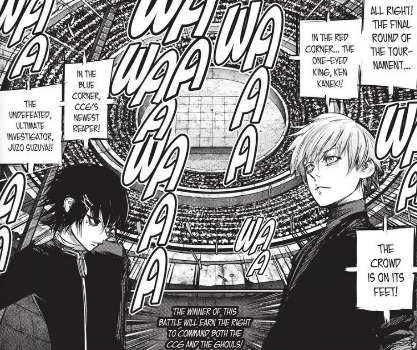
Gojo is a major character in the manga Jujutsu Kaisen, literally "Sorcery Fight" and he is the best sorcerer in the whole world. His entire identity revolves around being a sorcerer. Since he is so good and beloved at what he does, he thinks that everything is resolved by exorcising a curse or defeating a strong opponent. He has basically no identity outside of that. Which is why when he's fighting the possessed body of his student, a person he's been mentoring since childhood his priority is not to save Megumi but to beat a strong opponent. Gojo is a sorcerer, before a human being. That's who he is, that's who he always has been since day one.
I think part of the negative fan reaction comes from fans being really attached to this scene in the manga and deciding Gojo's entire character revolves around being a good mentor figure to children.

Which is just incorrect, Gojo's entire character revolves around being the strongest. On top of that though, Gojo can care about children and also care about being the strongest he can care about multiple things at once and have those things contradict each other because humans are complicated. I'd point out even in this panel where he's stating motivation he's not trying to raise these kids up into being healthy adults, he wants them to be strong Jujutsu Sorcerers. Even when he's raising kids, his intention is to turn them into Jujutsu Sorcerers because everything in Gojo's mind revolves around Jujutsu Sorcery. Gojo does not exist outside of the world of sorcerers. Gojo may be the chosen one but he'd never be able to hold down a job at Mcdonalds.
I think in general readers put more investment in the things characters say out loud, rather than their actions. You can say one thing and do another. I can say "I should never eat sweets again I'm going to improve my diet", and then go and eat ice cream five hours later. Gojo can state out loud his intention to foster children and protect their youths, but then fail to properly do that in the story. Characters are not always what they say they are, that's why they're interesting to interpret. This isn't me calling the readers stupid, just pointing out that Gojo is made up of contradictions. He wants to get rid of the old guard and replace them with something new, but Gojo IS THE OLD GUARD.
If the culling games arc has shown us one thing, it's that ancient sorcerers brought to the modern age do not care that much about human life on an individual level, they are all of them egoists. There's a reason Gojo resembles someone like Sukuna more than he does any other character in the manga. I'm not saying Gojo is exactly like Sukuna, he's far more altruistic and uses his genuinely noble ideals but at the same time Sukuna is a shadow archetype to Gojo he represents Gojo's flaws. The flaws that Gojo succumbs to in tragic fashion.
Which if you believe that Gojo genuinely does love his students, and the ideal he's fighting for is to raise up a better generation and allow them to live out their youths, then Gojo throughout the entire Sukuna fight is acting against those ideals. He cares far more about fighting Sukuna then he does saving Megumi, it's shown over and over again in the battle, Megumi is an afterthought to him. If Gojo care moredefeating the big bad and saving the world is more important than helping a child that Gojo is responsible for then Gojo is acting against his stated principles. Why should Gojo win the fight when he's fighting for all the wrong reasons?
Tragedies are like visual novels, if you make the wrong choice the novel will give you a red flag. If you ignore the red flag then you get locked into the route with the bad ending. Gojo always fights alone. Gojo only ever fights for himself, even if he's using that selfishness in support of a more noble ideal like creating a better generation of sorcerers. If Gojo consecutively makes the same changes then in a tragedy he's not going to be rewarded for it.
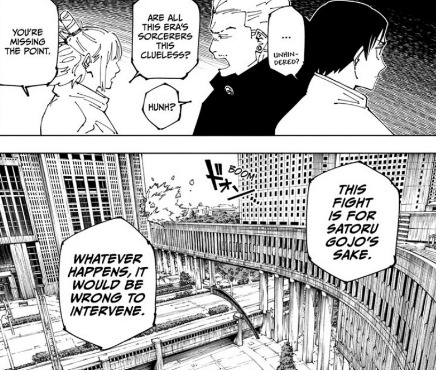
Gojo wants the old generation out and the new generation in, but Gojo resembles the old generation too much. Old sorcerers like Hajime and Sukuna respect him, Hajime argues that Gojo being able to fight for his pride is far more important than him living to the end of the battle when Yuta wanted to interfere and help him.
Gojo's death isn't a surprise curve ball that Gege is throwing us for shock value, it's a result of his choices throughout the manga. A manga about change, and the change between generations is not going to punish a character for remaining roughly the same. Of course you might find it disappointing that Gege didn't give Gojo the chance to grow and change and experience a character arc like Megumi or Yuji, but Jujutsu Kaisen is a tragedy, and the way Gojo's arc ended is consistent with what Gege wrote.

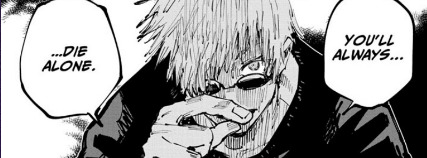
Jujutsu Kaisen is not just a tragedy though, it's a manga about death. The manga begins with Yuji's grandfather warning him not to die alone the way that he did. His grandfather's dying words are what motivate Yuji throughout the beginning of the manga as he's searching for a "proper" death.
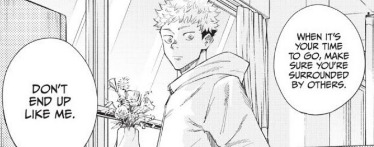
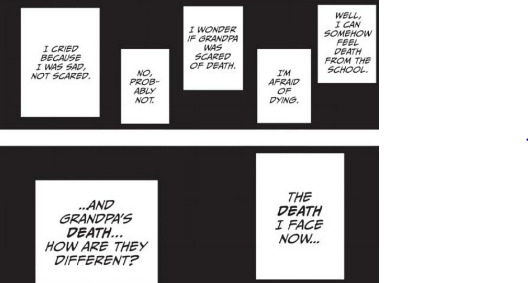

One of the major themes of Yuji's character is a contemplation of death. He accepts that death is inevitable, so he wants to save them from the gruesome deaths they'd experience if they became victims to curses and allow them to have a more satisfying death. Yuji's grandpa died an unsatisfying death because he died alone in a hospital room. Yuji even tries to make his own death a satisfying one because he believes by dying to seal away Sukuna he'll reduce the total number of casualties to curses.
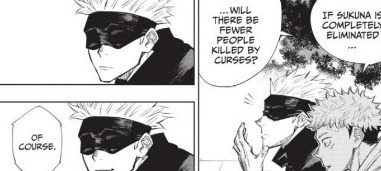
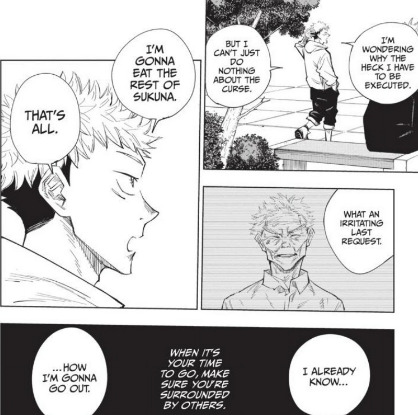
Jujutsu Kaisen keeps investigating the theme of death and what exactly would make for a satisfying death. At one point it's all but stated that death is the mirror that makes humans analyze their lives.
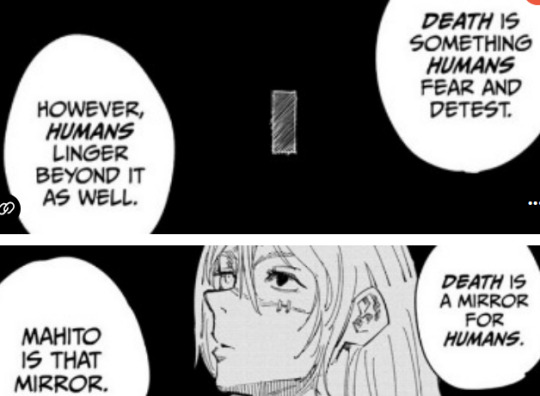
When Yuji fails to save Junpei from the "unnatural death" it calls into question whether or not his goal of saving people from unsatisfying deaths and the gruesome deaths caused by curses is even feasible. Nanami even says that Yuji might not be able to accomplish his goal and warns him away from the path.
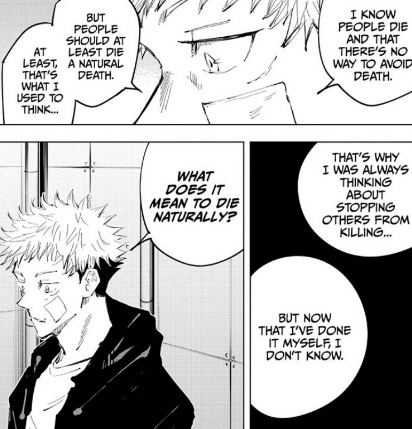
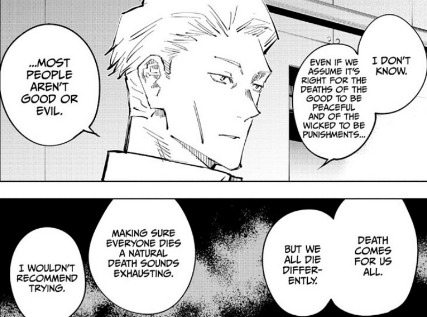
We see repeated unsatifying deaths in the manga, each time someone reflecting on their deaths that they weren't able to get what they wanted out of life. This list comes via @kaibutsushidousha by the way I'm quoting them.
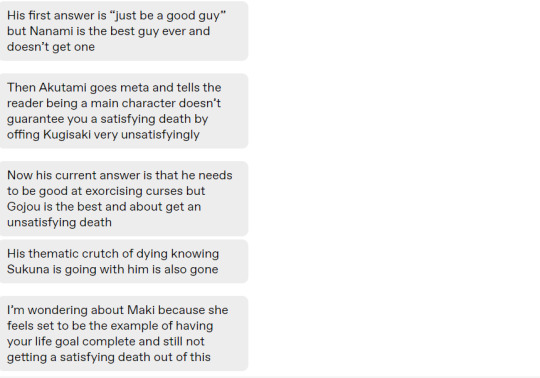
Nanami's a character who chose to work as a sorcerer because he didn't want to evade the responsibility of doing all you can to help people, he wanted to believe he's somewhere where he's needed. He never runs away from responsibility like Mei Mei does so he quite literally works himself to death, living and dying as a sorcerer. Nanami or Gojo's dying hallucination of Nanami even says as much, his death is the result of him choosing to go south and returning to be a sorcerer.
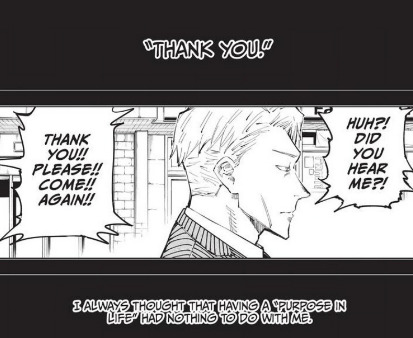
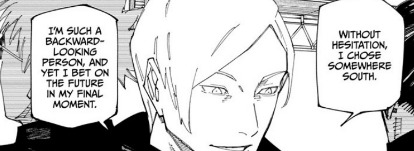
Maki chose revenge against the Zen'in over her sister, and as a result Mai is dead. Maki has all the power in the world now, her revenge complete but she's left with a sense of "now what?" She's as strong as Toji now but she failed to protect her sister, and it's the result of the choices she made. Maki's reflection isn't triumph, it's "I should have chosen to die with her."

Even Yuji himself is robbed of his narrative purpose. The manga began with Yuji saying he wants to choose how he's going to die and he'll die taking out Sukuna with him so he can reduce the number of people killed by curses in the world. Both of those things are thrown in Sukuna's face. Number one the amount of people Yuji can save by permanently killing Sukuna is now a moot point because he let Sukuna rampage in Shibuya.
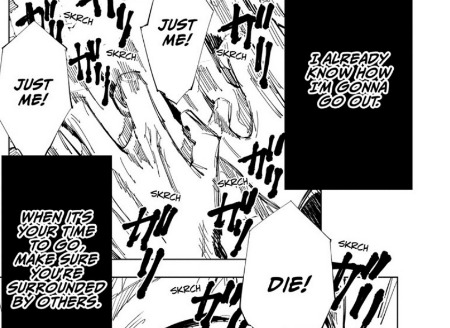
Number two, Sukuna isn't even in Yuji anymore. To build on what Comun said though, this repeated tragedy has a purpose to it and understanding requires understanding that Jujutsu Kaisen is an existentialist manga. Existentialism is basically a school of philosophy centered around the question of "Why do I exist?"
There's nothing about the invetability of death to make you question why you're alive in the first place. In the myth of Sispyhus, Albert Camus boils down all of philosophy to one question.
"There is but one truly serious philosophical problem, and that is suicide. Judging whether life is or is not worth living amounts to answering the fundamental question of philosophy. "
All of philosophy is should I shoot myself in the head or should I keep living? Everything comes after that question, which is why in Jujutsu Kaisen a lot of the characters motivations revolve around them contemplating death. Sorcerers exist in a world where they can die any moment, and as Gojo says most of them die alone. It might be the nature of sorcery itself that causes so many people to die, not only are they dying because they are trapped in an uncaring system, but the characters themselves aren't really attempting to live outside of it. They live and die as sorcerers, replaceable cogs in the machine.
All of these unsatisfying deaths may just be the result of all these characters making one choice, to live as sorcerers rather than people. Because to exist means to live in the world.
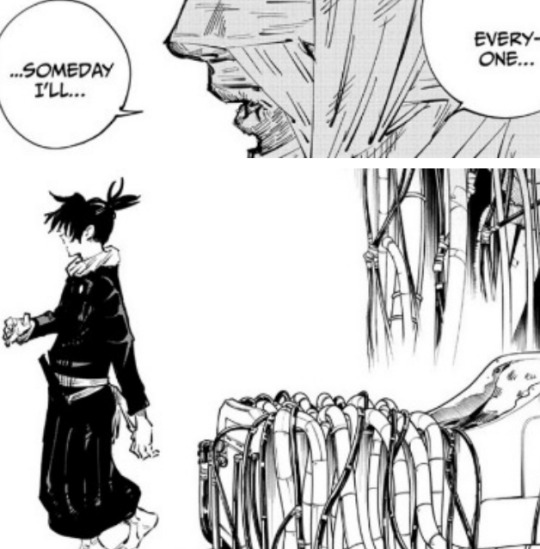

Even in Mechamaru's case, his goal is deeply existentialist by what I defined, all he wants to do is live in the world with everyone else rather than be stuck in his hospital room but his actions contradict that goal. Instead of letting his friends come and visit he's obsessed with the idea of getting a normal body because he feels that's the only way he can exist with everyone else, he makes a deal with the devil, he lies and goes behind their backs. He wasn't living with everyone else in the world and he could have chosen to, he chose wrong and his death is the result of that choice.

Jujutsu Sorcerers aren't living in the world. They're living in a little snowglobe far removed from the world with its own rules, most of them regressive and disconnected from the rest of society. If you define existentialism as just "living in the world' then a lot of these characters aren't, because they only exist in the world of sorcery.
INVISIBLE BUFFY: What are you talking ab-
SPIKE: The only reason you're here, is that you're not here. (drinking) INVISIBLE BUFFY: Right. Of course, as usual there's something wrong with Buffy. She came back all wrong. (moving around on the bed) You know, I didn't ask for this to happen to me.
SPIKE: Not too put off by it though, are you? (drinking) INVISIBLE BUFFY: No! Maybe because for the first time since ... I'm free. She tosses the sheet aside. Spike looks around, trying to figure out where she's going.
INVISIBLE BUFFY: Free of rules and reports ... free of this life.
SPIKE: Free of life? Got another name for that. Dead.
Not living in the world with everyone else is the same as being dead.
A lot of these characters either make the choice to act alone, or be a jujutsu sorcerer rather than a person and because of that they die as sorcerers, b/c sorcerers die that's what they do. Mai didn't want to keep living as a hindrance to Maki so she kills herself. Maki didn't want to be anything other than a sorcerer, so her little sister dies and she's not a big sister anymore. Nanami chose to leave his job behind and become a sorcerer again, he dies as one.
Of course I don't think the manga is punishing characters for being too egotistical, but rather too unbalanced. If anything Mai is too selfless and that is why she died, she didn't want to live for herself and chooses self sacrifice for her sister. An unbalance between selfishness or selflessness results in an underdeveloped ego. Jujutsu Kaisen doesn't punish individualism per se, moreso if you're not a fully developed individual you won't last long. Because it's also a manga about growing up in the world, and a person who doesn't have a healthy, mature, well-balanced sense of self is not a grown up.
This twitter user det_critics points out that Gojo (and also Yuki + Yuji's) failures in the manga can be attributed to the fact they don't have real senses of self.
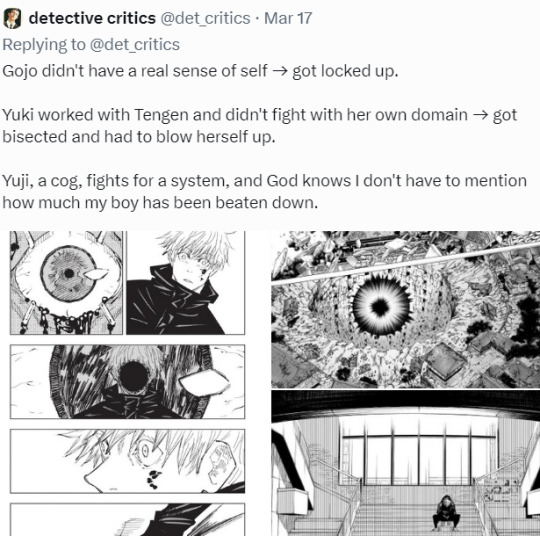
Gojo has an identity crisis as outlined by Geto, "are you Satoru Gojo because you're the strongest, or are you the strongest because you're Satoru Gojo?"
It's a challenge for him to find some reason to live outside of being the strongest, and in tragic fashion Gojo just doesn't find it in time. Gojo lived for fighting others, and proving to himself that he's the strongest, and that's how he dies.
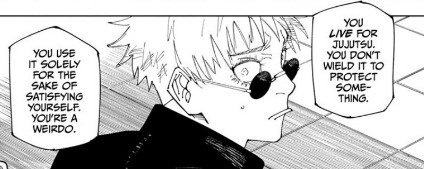
There's something I like to say about narrative punishment in stories. There are two ways to punish a character, you either don't give them what they want, or you give them exactly what they want. This is the latter, Gojo wanted to find someone stronger than him because deep down he believed that nobody could understand him unless they were on his level. He wanted to be surpassed, and that's why he focused on creating stronger young sorcerers, but he never shook himself of the belief that only someone as strong or even stronger than he was could ever be emotionally attached to him so he made a deliberate choice to draw a line between himself and others.
Gojo's essentially gotten what he wanted from that choice in the worst way possible. The student he picked to succeed him Megumi, has his body stolen and kills him. Gojo is surpassed, but it's not by one of his own students it's by an enemy that's not only trying to kill Gojo but is going to massacre his students afterwards.
Gojo's spent his entire life believing that because he's more powerful that makes him inherently different and above others, and being lonely because he himself believed he couldn't relate to ordinary people and he dies like an ordinary person, an unsatisfying death where he wasn't able to bring out Sukuna's best, where he gets unceremoniously cut in half offscreen but yay he's no longer the strongest. He's gotten exactly what he wanted. Megumi is still not saved, Sukuna's probably going to kill more people because Gojo failed to stop him here, but hey at least he stopped to compliment Gojo.
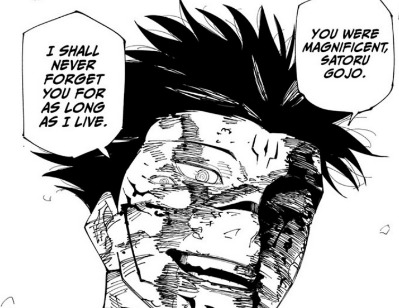
It's empty, but it's empty because of the choices Gojo made in life to just not bother connecting to people or develop any kind of identity besides being a sorcerer. Gojo lives and dies as a sorcerer, and his dying dream is returning to a teenager being surrounded by everyone he was with during his school days, because that's the happiest time in his life. Ironically he was happier before he became the strongest, because that was the only time in his life that he allowed himself to connect to people.
However in the eyes of others, he is someone who has it all. That's why he is always alone. There was no one who could hold the same sentiments and mutually understand him. Geto was the only one who could understand what he was trying to say, and the only one who could communicate well with him.
It's no coincidence Gojo and Geto die exactly a year apart on the same day, if anything I'd say the reasons they die are similiar to at least thematically. They both die because they don't want to live in the world. Geto thinks the world is too corrupt and GOjo doesn't want to be anything other than a sorcerer, both of them fail to adapt.
「 'It's just. . .'
It's just that it was what Geto had to do.
[...] To someone like him, the reality that the world of sorcerers presented to him was just too cruel.
'. . .that in a world like this, I couldn't truly be happy from the bottom of my heart.'」
They can't be happy in a world like this from the bottom of their hearts, so narratively they both die. The things they chose to live for at the end of their life they fail to accomplish, Gojo is no longer the stronget, Geto fails to wipe out mankind or make major changes to the world and they die as normal people unsatisfied because they weren't trying to live in the world and make connections to others. They die almost karmically a year apart because their main connection for both of them, the thing which made them feel connected to the world and other people was each other.
Which is why this panel breaks my heart and is so narratively satisfying because of how unsatisfying it is...
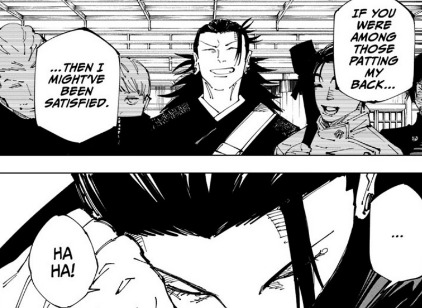
"If you were among those patting my back... then I might've been satisfied."
Gojo reflects that he's not satisfied dying against Sukuna, not because he failed to give him a good enough challenge but because Geto wasn't there to pat him on the back. The one thing that would have satisfied him he couldn't have, because he didn't live to connect to people he lived to be the strongest and he died alone as the strongest. There's just something deeply upsetting about Gojo's dying dream fantasy just him being there talking with all of his dead friends who he never appreciated or connected to properly when he was alive. Knowing that if something had just gone a little differently, that even if he had to die no matter what he could have died happier if Geto was among the people saying goodbye to him because that connection with Geto is what gave his life meaning.
Dazai Osamu: "A life with someone you can say good-bye to is a good life, especially when it hurts so much to say it to them. Am I wrong?"
-Bungou Stray Dogs Beast
#gojo satoru#jjk spoilers#jjk meta#jujutsu kaisen 236 spoilers#jjk 236#jujutsu kaisen 236#jjk 236 spoilers#jujutsu kaisen#jujustu kaisen meta#jujutsu kaisen theory#jujutsu kaisen manga#satoru gojo#geto suguru#suguru geto#satosugu
1K notes
·
View notes
Text
Tbh, I think if you read an mxtx novel with the expectation that the story’s hero is meant to learn some valuable lesson that fundamentally changes their character and views on life, then you are reading her books wrong. There’s not a single mxtx protag (currently) in existence who changes by the end of the story. It’s the world they live in that is changed because of their actions:
—Shen Yuan’s Shen Qingqiu transforms a toxic masculinity fantasy into a queer romance in which the unhappy stallion protagonist with a harem in the 100s is given his monogamous happy ending with a husband he actually loves and values with reciprocity. They fuck off to their forever honeymoon after exposing the corruptness of the cultivation world that ruined Luo Binghe’s life to begin with, and all of this was only possibly because Shen Yuan was just a genuinely nice fucking person. The world lives to see another day and a fuckton of people who died (or didn’t even get to exist) in the original stallion novel get to live long, more fulfilled lives in Shen Yuan’s revision.
—Wei Wuxian is killed for sticking up for a condemned clan, is resurrected against his will, and still stands by his actions in his first life while protecting those that continued to wrongfully condemn him. As a reward, the corpses of the people he died protecting save him and his loved ones (and the rest of the bystanders who killed them), he bags himself the most perfect and perfectly matched man in the cultivation world, and he continues to help others and do what he wants to the ire of the cultivation world who are now too embarrassed to fight him. The younger generation look to him as a beloved teacher, protector, and role model to aspire towards.
—Xie Lian rebelled against hierarchy as a beloved prince of a prospering kingdom, then as a beloved god against the older gods, then as a reviled scraps god against the then most popular gods of the present day. He was always willing to lend a hand to anyone who needed it and to never hold resentment even if that kindness blew up in his face (and it often did). He gets to marry the man (ghost) who has seen him at his best and absolute worst and chooses him unconditionally, something no one else has ever done before. At the end of the novel, he is the god that all the other gods look to for guidance and strength.
None of these stories humble these characters for being good people. Even when their morally righteous actions net them unimaginably terrible results, even when they falter in the face of their failures, they ultimately remain true to their goodness. And none of the books humble them for that, because being good is not a character flaw. So in short: please stop talking about how mxtx protags “needed” to learn valuable lessons to “be good people” when they were already good people from the very beginning. These stories are not about how the world changes people but how genuinely good people can change the world just by actively being kind even with no benefit to themselves and especially if that kindness leads to detriment.
4K notes
·
View notes
Text
The 5 Most Essential Turning Points in a Character’s Arc
You spend so much time creating a character because you want them to feel real. You want to connect with them and use them to create an experience for your readers. Their character arc is how that happens.
Don’t miss out on these essential turning points that make an arc feel not only whole, but complete.
1. The Inciting Incident
Your inciting incident gets your plot moving. It isn’t going to be the first sentence of your story (also called your hook), although it could be if you crafted your first sentence for that purpose.
An inciting incident is a plot event that guides your character in a new direction. It’s the successful prison break, the meeting of instant rivals, or the moment your protagonist wins the lottery in your first chapter.
Without the inciting incident, your protagonist’s life would carry on as usual. They wouldn’t start the arc that makes them an interesting person for the reader to stick with throughout your story.
2. Introducing the Protagonist’s Main Flaw
Every protagonist needs a primary flaw. Ideally, they’ll have more than one. People aren’t perfect and they rarely get close enough to only have one negative characteristic. Protagonists need that same level of humanity for readers to connect with them.
There are many potential flaws you could consider, but the primarily flaw must be the foundation for your character’s arc. It might even be the catalyst for the story’s peak.
Imagine a hero archetype. They’re great and well-intended, but they have a problem with boasting. Their arc features scenes where they learn to overcome their need to brag about themselves, but they get drunk and boast in a bar right before the story’s peak. The antagonist’s best friend hears this because they’re at the same bar, so they report the hero’s comment to the main villain. It thwarts the hero’s efforts and makes the climax more dramatic.
Other potential flaws to consider:
Arrogance
Pride
Fear
Anxiety
Carelessness
Dishonesty
Immaturity
3. Their First Failure
Everyone will fail at a goal eventually. Your protagonist should too. Their first failure could be big or small, but it helps define them. They either choose to continue pursuing that goal, they change their goal, or their worldview shatters.
Readers like watching a protagonist reshape their identity when they lose sight of what they wnat. They also like watching characters double down and pursue something harder. Failure is a necessary catalyst for making this happen during a character’s arc.
4. Their Rock Bottom
Most stories have a protagonist that hits their rock bottom. It could be when their antagonist defeats them or lose what matters most. There are numerous ways to write a rock-bottom moment. Yours will depend on what your character wants and what your story’s theme is.
If you forget to include a rock-bottom moment, the reader might feel like the protagonist never faced any real stakes. They had nothing to lose so their arc feels less realistic.
Rock bottoms don’t always mean earth-shattering consequences either. It might be the moment when your protagonist feels hopeless while taking an exam or recognizes that they just don’t know what to do. Either way, they’ll come to grips with losing something (hope, direction, or otherwise) and the reader will connect with that.
5. What the Protagonist Accepts
Protagonists have to accept the end of their arc. They return home from their hero’s journey to live in a life they accept as better than before. They find peace with their new fate due to their new community they found or skills they aquired.
Your protagonist may also accept a call to action. They return home from their journey only to find out that their antagonist inspired a new villain and the protagonist has to find the strength to overcome a new adversary. This typically leads into a second installment or sequel.
Accepting the end of their arc helps close the story for the reader. A protagonist who decides their arc wasn’t worth it makes the reader disgruntled with the story overall. There has to be a resolution, which means accepting whatever the protagonist’s life ended up as—or the next goal/challenge they’ll chase.
-----
Hopefully these points make character arcs feel more manageable for you. Defining each point might feel like naming your instincts, but it makes character creation and plotting easier.
Want more creative writing tips and tricks? I have plenty of other fun stuff on my website, including posts like Traits Every Protagonist Needs and Tips for Writing Subplots.
#character arcs#creating characters#creating character arcs#character development#writing characters#character concept#plotting#how to plot#writing plot#creative writing#writeblr#writers of tumblr#writing tips#writing advice#writing resources#writing inspiration#writing community#writing help#writing
1K notes
·
View notes
Text
The Owl House And Restorative Justice
At the end of Season 1 of The Owl House, it is revealed that Lilith, the main overarching antagonist of that season, was the one to curse her sister Eda, one of the protagonists, to win a tournament when they were teenagers. This information causes Eda to fly into a screaming rage and attack Lilith, and understandably so.
Eda’s curse is essentially a chronic illness, one that, in Eda’s own words, has ruined her life, being the reason she’s considered a social outcast and why, before meeting King and Luz, she hadn’t gotten close to anyone in years. In season 2, it’s revealed that the curse is why she pushed away her partner Raine to the point that they broke it off with her, and that during a particularly bad flareup, she accidentally maimed her own father, leaving him half blind and with permanent nerve damage to his hands, making him unable to continue working as a Palisman carver. The curse has ruled Eda’s life for decades now, so to Eda, this is the ultimate betrayal.
In the first episode of Season 2, Lilith has defected from the Emperor’s Coven, split the curse between Eda and herself to mitigate the symptoms for her sister, and has moved in with Eda at the Owl House. While Lilith herself still feels guilty and feels she has to make it up to Eda, everyone else, Eda included, has seemingly either forgiven her or chosen to look past it. Eda even makes fun of her for feeling bad about cursing her, and Lilith’s guilt is seemingly absent for the rest of the series.
The response to this was… Less than stellar, shall we say. A lot of people were angry, saying Lilith got away with her crimes without even a slap on the wrist, and that Eda’s forgiveness of her was far too sudden.
This isn’t the first time we’ve seen this kind of critique. Amity spent years bullying Willow after her parents forced her to break off their friendship, and when she began trying to mend that relationship, the response from fans was that Willow should have been a lot more angry at Amity, and that they went back to being besties far too soon. I’ve even seen this criticism leveled at Hunter for the things he did while working for Belos, at Vee for impersonating Luz for months to trick her mother, and at Luz for hiding the fact that she helped Philip find the Collector from her friends. And it does seem strange for the show to keep tripping on this same point again and again.
Except, it’s not really. Because I think that, when viewing this show from a different angle, those supposed flaws are actually symptoms of something very important to understand – The Owl House operates on a system of crime and punishment that is very different from our world’s.
More specifically, our world mostly utilizes retributive justice. The world of The Owl House utilizes restorative justice.
So first, what do those terms mean? Broadly, they’re two different forms of handling interpersonal disputes, or dealing with crime.
Retributive justice is the one our current justice system uses, where the focus is primarily on punishing the perpetrator. Retributive justice can mean detention, suspension, expulsion, jail time, monetary fines, some kinds of community service, exile, or in more severe cases, corporal punishment or the death penalty. It’s the lens most people view the world through, where if someone hurts you, hurting them back is the correct response.
Restorative justice is a very different approach, where you instead focus on helping the victim recover from what happened, and rehabilitating the perpetrator to prevent this from happening again. Restorative justice can look like verbal or written apologies, monetary compensation for costs and trauma, therapy for both victim and perpetrator, education for the perpetrator, mediation between victim and perpetrator, a restraining order, etc.
When viewed through a retributive lens, The Owl House lets its characters get away with a lot of shit. Lilith cursing Eda, Hunter rounding up Palismen knowing they’ll be killed, Amity tormenting Willow for years, it’s all stuff that, in a retributive environment, they should be punished for, and they’re just not. Eda is only genuinely angry at Lilith for two scenes, Amity and Willow fix their relationship very quickly once Amity starts making amends, and Hunter isn’t punished at all.
However, I believe the story of The Owl House is best viewed not through a retributive lens, but through a restorative lens.
Let’s look at the Lilith-example again. Lilith’s offense was cursing Eda, which she did because she wanted to win a spot in the Emperor’s Coven. Knowing Eda was better than her, she cast a curse on her, thinking it would only last for a day. But when the time came, Eda forfeited the match, soon after which she transformed into the Owl Beast and was pelted with rocks until she ran. The curse turned out to be very permanent, and Lilith spent the next 20 years trying to fix her mistake by working for Belos to try to capture Eda, since he promised to heal her curse.
However, when she finally succeeded, Belos went back on his promise. Instead of healing Eda, he ordered her to be publicly executed. When Lilith protested, Belos essentially told her to shut up, that it was the Titan’s will, and left her there.
So, having realized her method of fixing her mistake has gone real bad, Lilith sneaks down to the Conformatorium to free Eda herself, but arrives too late and finds Luz instead. After a brief fight they end up teaming up, and Lilith leads Luz to the elevator, but they are captured by Belos and Lilith is thrown into the cage with Eda. There, she restores Eda’s partially petrified body, and after fleeing with her, Luz and King, uses a spell to split Eda’s curse evenly between their two bodies.
From a restorative justice point of view, Lilith has done pretty much everything she reasonably could do to fix things. She’s denounced the Emperor’s Coven, returned Owlbert to Luz, helped Luz find the elevator to the execution platform, saved Eda from petrification, apologized to Eda, and while there’s no way for her to cure Eda’s curse entirely, she took on half of the curse at great expense to her own health, in order to ease Eda’s symptoms.
Eda isn’t angry anymore because in her eyes, Lilith has already fixed things with her. Punishing her more at this point is pointless. What more could Lilith do, really? What other lessons could she learn? The only thing that punishment would bring at this point would be more suffering.
Let’s look at another example: Amity and Willow.
Amity’s offense was breaking off her friendship with Willow because she was a late-bloomer, bullying her for years, and allowing her friends to do so too. Willow is left with horrible self-esteem issues because of this, and combined with her failing grades, turned her into a horribly shy and withdrawn wallflower (no pun intended). After she’s moved to the plant track she starts actually getting better, but Amity and Boscha especially continue to torment her. While Amity’s bullying of Willow does peter out over time, Willow is clearly still extremely resentful of her. In an attempt to make Willow forget their friendship, Amity accidentally sets most of Willow’s memories on fire, leaving her confused, amnesiac, and unable to grasp basic concepts like that chairs are for sitting in.
Luz pushed Amity into fixing Willow’s brain by going into her mind together and piecing her memories back together. There, the Inner Willow revealed what happened to Luz and the audience.
At this point, Amity shows her that her parents were actually the ones who forced her to end the friendship because they didn’t think Willow was a suitably powerful or influential friend, threatening to make sure Willow would never get accepted into Hexside if Amity didn’t force her to leave. Amity then apologizes to Willow for going along with it, and for the bullying, and vows to make sure her friends never mess with Willow again.
Willow accepts her apology, but also makes it clear that, while it’s a start, she’s not yet ready to accept Amity in her life again. Restorative justice has not been fully attained, because to Willow, Amity hasn’t fixed everything – Boscha and her squad are still bullying her, and still consider Amity one of them. This changes two episodes later, when Amity tells Boscha to grow the fuck up when she starts bullying Willow again, and joins her and Luz’s Grudgby team despite her personal issues to get Boscha to back off. Willow doesn’t make a grand gesture of forgiveness in this episode, but it is after this point where the two become comfortable around eachother again.
Did Willow forgive Amity too quickly for years of trauma? Maybe. If she had chosen to continue keeping Amity at a distance I certainly wouldn’t have blamed her. But in the end, Amity fixed the mess she caused as best she could, and has proven herself to want to be a better person, to want to be Willow’s friend again. She worked hard to prove herself to be a person worth trusting, and Willow decided to give that trust a chance again.
And while they did become friends again, that friendship was clearly still affected by what happened, which led to bumps that the two of them had to work through. Like in Labyrinth Runners, where Amity’s overprotectiveness over Willow makes Willow feel like Amity thinks she’s incompetent, and still only sees her as the helpless person she used to be.
Willow continuing to be mad at Amity and punishing her for what she did wouldn’t be an unreasonable reaction, but it wouldn’t have fixed anything. It would certainly have an impact on Amity, seeing her former best friend rejecting her attempts to make up for what she did, but the hurt on both sides would have continued festering, because deep down, Willow missed Amity too.
In Hunter’s case, there’s the question of whether he can even be held responsible for his actions. The Palisman-kidnapping in specific was explicitly done under duress – if he failed he would face verbal and physical abuse, and be threatened with his nightmare scenario: getting thrown out of the Emperor’s Coven.
And that’s not an empty threat either. Hunter has no magic, and Belos has drilled it into him that witches without magic have no future. Without the Emperor’s Coven, his only future prospects would be starving to death on the streets or wasting away in prison. Either way, Hunter would be alone, without family or friends, without a job or job prospects, without anyone to turn to for help. Any child would be terrified of that. Hunter wasn’t always acting on direct orders – in fact he defied direct orders to stay in his room in Eclipse Lake to go look for Titan’s Blood, and then again in Hollow Mind to arrest the rebels. But he made those choices based on the idea that Belos wouldn’t want him if he was a failure, and that he needed a chance to prove that he could still be useful.
And contrary to popular belief, Hunter does know right from wrong. He has a very strong moral compass, he’s just been forced to ignore it in favor of doing whatever the Emperor wants. To shut up that little voice telling him he’s doing the wrong thing, he uses what’s called a thought-terminating cliche, a statement that feels so fundamentally true that the argument need not continue. In Hunter’s case, that statement is “It’s for the greater good.” Sure, kidnapping his new friends and abducting Palismen to feed to the Emperor and threatening someone who’s been nothing but kind to him to take the portal key from her girlfriend and justifying terrorism makes his stomach feel like he swallowed a cactus and saying it out loud makes him sound like a horrible person – but it’s for the greater good. He’s doing it to serve Belos, and Belos knows what’s best.
So by the time Hunter is out of active danger and able to rest and recover from what happened to him… what would further punishment accomplish? He already knows that he did fucked up shit while working for the EC, and he’s proven time and time again that while he’s not fighting for Belos’s approval, he’s actually a genuinely kind-hearted kid. Punishing him now would likely cause him to react very poorly, because he’s been at the wrong end of that stick so often that he’s developed severe PTSD because of it.
And if you think restorative justice is still in order – Hunter is currently hyperfixated on making sure Belos can never hurt anyone again, and for the long term, he has expressed that he wants to become a Palisman carver when he grows up. While it won’t bring back the Palismen that were killed, it will help the current Palisman population recover and reintroduce Palismen to witches who may have had to give up theirs.
When viewed through this lens, the writing of The Owl House starts to make more sense. As a show, it is extremely forgiving towards its characters – they’re still held accountable for their actions, but as long as they’re willing to grow and learn and fix the damage they caused, they are very quickly forgiven.
However, I do understand why these writing choices can be… controversial, so to say. Because it doesn’t feel very satisfying, does it? When someone hurts you on purpose, your first impulse would be to try to hurt them back, that’s just how people work.
That’s the hardest thing to come to terms with when you become an advocate for prison abolition for example – you’re not just arguing for freeing a guy who got 5 years because a cop found weed in his pockets, you’re arguing for the release, and most importantly, the humanity of some of the most vile, disgusting people this planet has ever produced. Even now, when someone commits a truly awful crime and gets sent to prison for life, my first thought is “Good, I hope they rot in there.” But that’s not justice. That’s just revenge. And revenge is not something we as a society should want to build our justice system on.
It’s not satisfying to see Lilith go from using Luz as a human shield in her fight against Eda to sleeping on the couch in Eda’s house within 2 episodes. It’s not satisfying to see Willow let Amity back into her life when Amity has hurt her so badly before, or to see Hunter become romantically involved with Willow after he literally abducted her the first time they met. But that satisfaction isn’t really the point. Revenge is satisfying in the moment, but an eye for an eye makes the whole world blind, and if someone shows a genuine willingness to change, it’s often better to give them a chance to.
However, my final point is about what happens when this approach fails. Because not everyone is willing to change. Some people, when faced with the consequences of their actions, decide to dig their heels in and refuse to admit fault, or blame the victim(s), or use those same thought-terminating cliches that Hunter used to justify their actions, “I was just following orders” being a big one.
And thus, we come to Belos.
If Belos showed a willingness to change, a genuine one, not an attempt at manipulation, should he be given the chance to? That vengeful part of me is VERY empathetically saying no. But logically, reasonably, he should be given that chance, if only because he’s a human being and no human being deserves to be mistreated. That doesn’t mean his victims are obligated to forgive him or be around him again, in fact I think that, for the sake of Hunter’s mental health, Belos should stay as far away from him as humanly possible. But he should be given the chance to start over, to truly better himself and do something good with the rest of his life.
But Belos isn’t willing to change.
Belos is a product of a bad environment and grew up with a cult-like mentality and hatred for witches that he had to adopt for his own safety. It’s hard to break out of that mentality, but not impossible. Case in point: Caleb. The tragedy of Belos’s character to me is that he had so many chances to change, so many people to help him make that leap, but all of the people who offered him that help ended up dead by his hands because he couldn’t handle the idea that he may have been wrong.
At this point, Belos is stuck. Changing would mean not only giving up on his life’s work, but acknowledging to himself that everything he’s done, mutilating his body, killing his brother, slaughtering thousands and installing himself as God-Emperor of a population he despises more than anything in order to facilitate a genocide, was completely pointless.
He can’t admit that to himself. Especially the thing about Caleb’s death. He’s sunk-cost-fallacied himself so far into a corner that all he can really do when faced with opposing viewpoints is dig his heels in even deeper and lash out in a rage at anyone who challenges him. Even now, when his body is literally falling apart at the seams, he’s still trying to commit witch-genocide, because it’s all he has.
Restorative justice doesn’t work in this case, because the perpetrator needs to be receptive to it. Logically you would assume the show would default to retributive justice, and characters like Willow and Camila do take a very vengeful glee in imagining themselves beating the snot out of Belos. But right now, the primary motivation of the Hexsquad and Hunter in particular when it comes to Belos is to end the threat he poses. As long as Belos is alive and free, he will continue to hurt and kill people, and if he can’t be talked down, he needs to be either contained or killed to prevent him from causing more harm.
The Owl House provides, in my opinion, a very nuanced take on restorative justice. It shows how it works in action, how different situations impact what it looks like, and what happens when it’s simply not an option. It’s not the most satisfying story to tell your audience, because when someone hurts our babies we want them to suffer, no matter how sorry they say they are. But in this case, I think that sacrificing that bit of audience comfort is worth it to tell the story like this.
3K notes
·
View notes